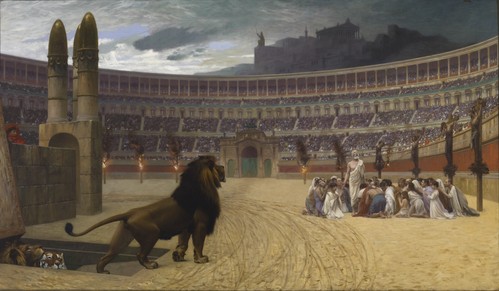Seven Reasons to Study Church History
Seven Reasons to Study Church History

This Sunday we will begin a new Sunday School series that will follow the early centuries of church history from Jerusalem to Nicaea. We will begin with Pentecost and conclude with the Council of Nicaea in 325 AD. In between are stories of the courage of martyrs, the formation of the New Testament, and the advance of the Gospel throughout the world.
Why should we study church history? Why is church history important for the church?
1. Church history bears witness to the faithfulness of Christ. “I will build my church, and the gates of hell shall not prevail against it” (Matt 16:18). His words are true, and the church continues to be built as new believers come to faith in Christ. Church history is the story of the work of Christ through the church in the work of the Great Commission. The preaching of the Gospel has gone out to the nations, passing down through time and generations until it has come to us. We should know this story.
2. We have a family tree of faith and church history is the story of our family. Since the founding of the church by Christ and the apostles (Eph 2:20), many brothers and sisters have been added to the church. We have received “a hundredfold now in this time, houses and brothers and sisters and mothers and children and lands, with persecutions” (Mark 10:30). We should get to know our brothers and sisters.
3. Church history gives us examples to follow. “Consider the outcome of their way of life, and imitate their faith” (Heb 13:7). We should learn from those who have led and taught the church in past ages. Observing their testimony and perseverance in times of suffering and tribulation should encourage and inspire us to be faithful. Their faithfulness in the past encourages us to be faithful in the present.
4. We have a theological inheritance. Pastors and theologians have guarded the truth with creeds and confessions, and we have a rich heritage of truth that has been passed down to us. From the doctrine of the Trinity to our understanding of the humanity and divinity of Christ, we are blessed by the theological labors of the past and we stand on the shoulders of those who have gone before us. We should understand the richness of our theological heritage.
5. Church history is essential in an age of dishonesty. We live in an age of revisionism where there is great dishonesty and misunderstanding about the history of the church. It is important to have a solid grasp of true history and not be led astray by false teachers who seek to discredit Christianity. We must know the truth of history so we can reject and repudiate bad readings and fabrications about the bride of Christ.
6. Church history strengthens our confidence in the faith once delivered to the saints. Who wrote the Bible and how was it assembled? How did the early Christians stand up under the challenges of Roman persecution? What heresies have come against the church? What trials has the church overcome through the ages? How has the Gospel brought transformation throughout the world? It is important that we equip ourselves with this history so that we might better understand our faith.
7. Church history increases our thanksgiving. When we observe God’s gracious providence and the power of the Scriptures through the last two thousand years, it is right that we respond with thanksgiving and praise to God for what we have been given through the church.
I could keep going, but I’ll stop with a book recommendation: Church History 101: The Highlights of Twenty Centuries by Sinclair B. Ferguson, Joel R. Beeke, and Michael Haykin. This book will be available on our bookshelf. It’s a very short read and provides helpful points of reference for those who would learn more about church history.
I look forward to starting Early Church History this Sunday. Please pray with me that it would be encouraging and edifying, and that God would be glorified in it.
Blessings in Christ,
Pastor Ben
Why should we study church history? Why is church history important for the church?
1. Church history bears witness to the faithfulness of Christ. “I will build my church, and the gates of hell shall not prevail against it” (Matt 16:18). His words are true, and the church continues to be built as new believers come to faith in Christ. Church history is the story of the work of Christ through the church in the work of the Great Commission. The preaching of the Gospel has gone out to the nations, passing down through time and generations until it has come to us. We should know this story.
2. We have a family tree of faith and church history is the story of our family. Since the founding of the church by Christ and the apostles (Eph 2:20), many brothers and sisters have been added to the church. We have received “a hundredfold now in this time, houses and brothers and sisters and mothers and children and lands, with persecutions” (Mark 10:30). We should get to know our brothers and sisters.
3. Church history gives us examples to follow. “Consider the outcome of their way of life, and imitate their faith” (Heb 13:7). We should learn from those who have led and taught the church in past ages. Observing their testimony and perseverance in times of suffering and tribulation should encourage and inspire us to be faithful. Their faithfulness in the past encourages us to be faithful in the present.
4. We have a theological inheritance. Pastors and theologians have guarded the truth with creeds and confessions, and we have a rich heritage of truth that has been passed down to us. From the doctrine of the Trinity to our understanding of the humanity and divinity of Christ, we are blessed by the theological labors of the past and we stand on the shoulders of those who have gone before us. We should understand the richness of our theological heritage.
5. Church history is essential in an age of dishonesty. We live in an age of revisionism where there is great dishonesty and misunderstanding about the history of the church. It is important to have a solid grasp of true history and not be led astray by false teachers who seek to discredit Christianity. We must know the truth of history so we can reject and repudiate bad readings and fabrications about the bride of Christ.
6. Church history strengthens our confidence in the faith once delivered to the saints. Who wrote the Bible and how was it assembled? How did the early Christians stand up under the challenges of Roman persecution? What heresies have come against the church? What trials has the church overcome through the ages? How has the Gospel brought transformation throughout the world? It is important that we equip ourselves with this history so that we might better understand our faith.
7. Church history increases our thanksgiving. When we observe God’s gracious providence and the power of the Scriptures through the last two thousand years, it is right that we respond with thanksgiving and praise to God for what we have been given through the church.
I could keep going, but I’ll stop with a book recommendation: Church History 101: The Highlights of Twenty Centuries by Sinclair B. Ferguson, Joel R. Beeke, and Michael Haykin. This book will be available on our bookshelf. It’s a very short read and provides helpful points of reference for those who would learn more about church history.
I look forward to starting Early Church History this Sunday. Please pray with me that it would be encouraging and edifying, and that God would be glorified in it.
Blessings in Christ,
Pastor Ben
Recent
What is Church For?
February 19th, 2026
How to (Pick Up and) Profit From Your Bulletin
February 12th, 2026
Introducing Liturgy: A Concept More Familiar Than You May Think
February 5th, 2026
Preparing for Worship (Sunday, February 1)
January 30th, 2026
Preparing for Sunday and Winter Snow
January 23rd, 2026
Archive
2026
January
2025
January
April
August
September
November
2024
April
May
August
November
2023
February
September
2022
February
April
September
2021
August
September
